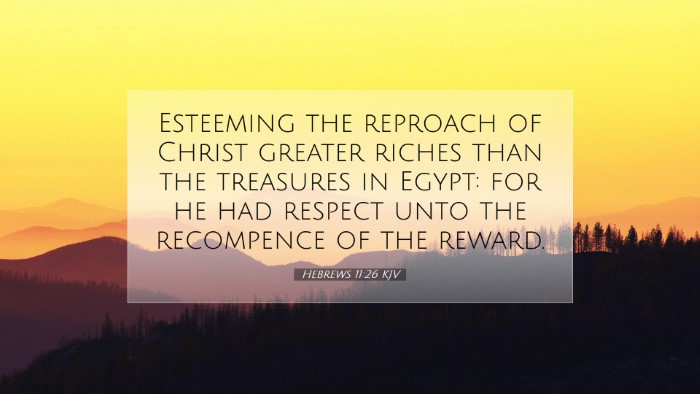Hebrews 11:26 Commentary
Verse Context: Hebrews 11:26 states, "Esteeming the reproach of Christ greater riches than the treasures in Egypt: for he had respect unto the recompense of the reward." This verse highlights the faith of Moses and his choosing to align himself with God's people instead of enjoying the privileges of Egyptian royalty.
Introduction
The eleventh chapter of Hebrews is often referred to as the "Hall of Faith", where the author meticulously outlines examples of faith from the Old Testament. Within this rich tapestry, Moses occupies a prominent role, and verse 26 specifically draws attention to the profound choices he made based on faith. Insights from public domain commentaries deepen our understanding of this pivotal moment in biblical history.
Moses: A Man of Faith
Matthew Henry's Commentary: Henry emphasizes Moses' faith as a profound act of self-denial. He points out that Moses, raised in the opulence of Pharaoh’s court, chose the hardships of his brethren over the fleeting pleasures of Egypt. His choice demonstrates a deep conviction that the riches associated with Christ, though not seen, are far more valuable than earthly treasures.
Albert Barnes' Notes: Barnes adds that Moses saw through the facade of worldly riches. His understanding of the "reproach of Christ" suggests he had a prophetic insight into the coming Messiah and valued this relationship over his status. Barnes notes that such esteem is a hallmark of true faith that transcends temporal benefits.
Adam Clarke's Commentary: Clarke takes a slightly different angle, discussing the historical and cultural context of Moses’ decision. He illuminates the societal expectations of wealth and power in Egypt and contrasts it with the spiritual riches of belonging to God's covenant people. Clarke argues that Moses exemplifies the true nature of faith that prioritizes eternal perspectives over temporal gains.
The Reproach of Christ
The phrase "the reproach of Christ" indicates a deep theological truth. It refers to the conflicts and sufferings endured for the sake of Christ—a theme central to the New Testament.
- Matthew Henry: He highlights that suffering for Christ's sake is a privilege and marks one’s true discipleship, reflecting the sufferings of Christ Himself.
- Albert Barnes: He elaborates on the concept of shame or reproach, suggesting that aligning with Christ often brings ridicule and scorn from the world, which Moses embraced willingly.
- Adam Clarke: Clarke remarks that this "reproach" could also foreshadow the condemnation faced by Christians throughout history, and faith is often validated through endurance of such persecutions.
Worldly Riches vs. Eternal Reward
The juxtaposition of worldly treasures and the eternal reward is a critical theme in this verse. The choice faced by Moses is reflective of the choices faced by believers today.
- Moses' Insight: Henry points out that Moses sought the eternal rather than the temporary, illustrating a faith that weighs future promises against present comfort.
- Materialism and Spirituality: Barnes warns Christians of the trap of materialism, urging a focus on eternal glory that greatly outweighs any earthly treasures.
- Faith in Action: Clarke encourages believers to follow in Moses' footsteps, translating faith into action, even if it means facing hardship and societal rejection.
The Concept of Esteem
The idea of "esteeming" reflects a deeply held belief system and values hierarchy.
- Value System: According to Henry, true faith reshapes one's values, leading to choices that indicate a preference for eternal realities over temporary pleasures.
- Living for the Future: Barnes illustrates that Moses' foresight allowed him to value the "recompense" of his faith, encouraging believers to invest in spiritual endeavors.
- Spiritual Maturity: Clarke highlights that mature believers will also learn to esteem spiritual riches as paramount in their lives, encouraging growth in faith.
Conclusion
Hebrews 11:26 serves as a stirring reminder for believers to weigh their decisions in light of faith, embracing the deep spiritual truths that define a life led by Christ. The insights from the commentaries of Matthew Henry, Albert Barnes, and Adam Clarke elucidate key themes of faith, choice, and eternal perspective. For pastors, students, and theologians, this scripture captures the essence of a life surrendered to God’s greater purposes amidst a world entangled in materialism.


